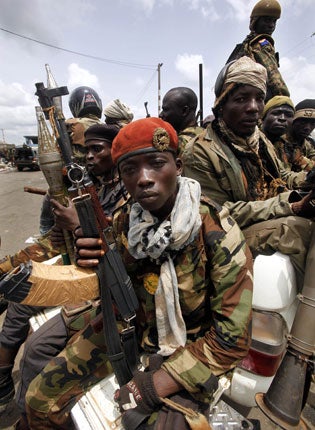UN staff flee Abidjan amid warnings of 'bloodbath'
Troops loyal to Ivory Coast's recognised President-elect prepare for 'final push'

Your support helps us to tell the story
From reproductive rights to climate change to Big Tech, The Independent is on the ground when the story is developing. Whether it's investigating the financials of Elon Musk's pro-Trump PAC or producing our latest documentary, 'The A Word', which shines a light on the American women fighting for reproductive rights, we know how important it is to parse out the facts from the messaging.
At such a critical moment in US history, we need reporters on the ground. Your donation allows us to keep sending journalists to speak to both sides of the story.
The Independent is trusted by Americans across the entire political spectrum. And unlike many other quality news outlets, we choose not to lock Americans out of our reporting and analysis with paywalls. We believe quality journalism should be available to everyone, paid for by those who can afford it.
Your support makes all the difference.The United Nations has started to evacuate its staff from Abidjan ahead of a bloody final battle for Ivory Coast's commercial capital that is expected to start today.
Laurent Gbagbo, who has refused international appeals to stand down after losing an election last year, has ordered his supporters into the streets to form a "human shield" around him while the forces of Alassane Ouattara, the President-elect, have been massing on the outskirts of the city.
"We are in the last kilometre of a marathon, the last step, which is always the toughest," UN spokesman Hamadun Touré told The Independent by telephone from Abidjan.
He said that the UN headquarters in the city had been repeatedly attacked by Mr Gbagbo's presidential guard and that all non-military staff was being evacuated. "We are under attack, they have been firing on our patrols," Mr Touré said. "We are coming under frequent heavy fire."
Witnesses said the streets of Abidjan have been deserted as hundreds of armed youth militia loyal to Mr Gbagbo, known as the "Young Patriots", have moved into the centre and set up road blocks. "The fighting is on and off but the one constant is that Abidjan is a ghost city," Mr Touré said.
The only civilians who ventured outside yesterday did so to fetch water and had their hands raised to avoid being shot, according to witnesses.
Mr Ouattara's Forces Nouvelles swept down through Ivory Coast last week in a lightning offensive that captured much of the country, including the official capital, Yamoussoukro, and the important port city of San Pedro.
But hopes of a swift end to the four-month crisis that followed Mr Gbagbo's refusal to concede electoral defeat have foundered in the streets of Abidjan. Despite large-scale defections by police and army officers, special forces loyal to Mr Gbagbo have checked the advance of the Force Nouvelles, recapturing the state television station on Saturday. Mr Gbagbo then appeared in a televised broadcast, saying that he was the victim of a "French plot" and calling on his supporters to descend into the streets to form a human shield around the presidential palace.
Boatloads of Young Patriots were ferried across the lagoon city to take up positions and witnesses described hundreds of youth on the streets carrying rudimentary weapons such as lumps of wood and metal bars.
An aide to Mr Ouattara told reporters last night that their forces had massed on the northern edge of the city and would make a "final push" today.
Analysts were warning that a blood bath was possible as US Secretary of State Hillary Clinton called on UN peacekeepers to "aggressively enforce" their mandate to protect civilians.
Philippe Hugon, a professor at the Institute for International and Strategic Relations, said the international response to the crisis in Ivory Coast had been weak and contrasted unfavourably with the UN Security Council's actions in Libya. "The situation in the Ivory Coast is different to that in Libya and a no-fly zone would be irrelevant, but the UN force there is not sufficient to deal with the scale of the crisis," he said.
Ten thousand UN peacekeepers have been deployed in the West African nation and hundreds more French troops landed yesterday at Abidjan's airport, which has been under French control since Saturday. Some 1,500 foreigners were under French protection and were being evacuated. Professor Hugon said that Mr Gbagbo's attempts to incite violence against foreigners in Abidjan risked igniting an intercommunal bloodbath in the rest of the country: "The problem in Ivory Coast is not an ethnic problem, or a religious one. The problem is abuse of power and the way that ethnic issues are being exploited."
A surge in casualties in the west of Ivory Coast, reported by Médecins Sans Frontières (MSF), has sparked fears that intercommunal violence has already started. The situation remains "extremely tense and violent" in and around several cities in western Ivory Coast, the medical-aid organisation said. Its staff was treating many wounded people, suffering from gunshot or machete wounds, who have arrived in hospitals despite major fighting in these areas ending three days ago.
"The number of new casualties is extremely disturbing and indicates that violence continues in the area," MSF's Renzo Fricke said. "Intercommunal tensions are extremely high."
Join our commenting forum
Join thought-provoking conversations, follow other Independent readers and see their replies
Comments